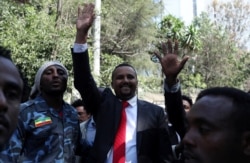Prominent Ethiopian activist Jawar Mohammed called for calm on Thursday amid protests that have killed 16 people and are challenging Nobel Prize-winning Prime Minister Abiy Ahmed in his political heartland.
Addressing hundreds of supporters gathered around his house in Addis Ababa, Jawar said: "Open the blocked roads, clean the towns of barricades, treat those who have been injured during the protests and reconcile with those you have quarreled with."
He struck a conciliatory tone toward the government, saying it was "not the time to kill each other", but warned his supporters to stay alert. "Calm yourself," he told the crowd at his house, "but sleep with one eye open."
People have died in at least four cities since clashes began on Wednesday, officials and a witness said, after police fired gunshots and tear gas to break up demonstrations in support of Jawar.
In two of the towns where violence occurred on Wednesday, Harar and Dodola, residents said that young men began opening the roads on Thursday afternoon, after Jawar's comments to his supporters.
"The road to Addis Ababa is now open," said a regional official in Harar. A resident in Ambo, another site of earlier violence, said that protesters had heeded Jawar's call to clear roadblocks and go home, but police shot at them. The regional police commissioner did not immediately respond for a request for comment.
A media entrepreneur and activist from the Oromo ethnic group, the country's largest, Jawar organized protests that propelled Abiy to power last year.
Abiy oversaw rapid political reforms after decades of repressive rule, winning international praise that culminated in last week's award of the Nobel Peace Prize for ending a decades-long conflict with neighboring Eritrea.
But the greater freedoms unleashed long-repressed tensions between Ethiopia's ethnic groups as local leaders claim more resources for their own regions. This week Abiy accused unnamed media figures of promoting ethnic interests over national unity.
Jawar, a one-time ally of the prime minister, has mobilized protesters from the Oromo ethnic group - the same group Abiy comes from. The showdown is a litmus test for Abiy: If he backs down, it could embolden Jawar and other regional powerbrokers.
But widespread violence would tarnish his reformist credentials.
A spokeswoman for the prime minister did not respond to requests for comment.
Late on Tuesday, police ringed Jawar's house and told his bodyguard to leave, he told Reuters. Hundreds of people quickly gathered in support. Protests spread in the capital and to other cities, where police fired teargas and guns to disperse them.
On Thursday, Jawar supporters dug in, erecting tents by his house. Some chanted: "We don't want Abiy, we don't want Abiy."
Half a dozen police stood at a distance from the protesters.
"One week, one month, we don't care," said a young protester, who asked for anonymity for fear of repercussion from the security forces. "We will stay here until the government tells us why they did this to Jawar."
Protests and Politics
Jawar, an Ethiopian-born U.S. citizen, mobilized many thousands of young men all over the Oromiya region to protest against the government from 2016 to 2018, finally forcing Abiy's predecessor, Hailemariam Desalegn, to step down - the first time a prime minister had resigned since independence.
Jawar and Abiy were photographed together frequently last year, but the prime minister on Tuesday appeared frustrated.
Abiy told parliament, without naming anyone, "Media owners who don't have Ethiopian passports are playing both ways."
"We tried to be patient. But if this is going to undermine the peace and existence of Ethiopia ... we will take measures."
Abiy must walk a delicate line between increasing political freedoms and reining in strongmen building ethnic power bases.
Some Ethiopians have criticized Jawar for using ethnically-tinged language, but many young Oromo men consider him a hero.
Ethiopia is due to hold elections next year. The four main ethnically-based parties in the ruling coalition, in power since 1991, will compete with new, more strident parties. Jawar could help mobilize support for the coalition - or a rival.
Death Toll Climbs
On Thursday morning, the army was deployed in Dodola, about 300 km (185 miles) south of the capital, after six people were killed, said an official at Dodola hospital. He said three had been shot and three beaten to death.
A army spokesman said he had no information on the army being deployed anywhere.
In Ambo town, 100 km (60 miles) west of the capital, five protesters died from wounds from gunshots and stones since Wednesday, Oromiya regional police commissioner Kefyalew Tefera told Reuters.
Security forces fired to disperse protesters setting tires alight, 30-year-old Solomon Kidanu told Reuters by phone as gunshots cracked in the background.
In Harar, 500 km (310 miles) east of the capital, police shot two people on Wednesday, an official said, and protesters killed a third because they suspected him of being an informant.
A businessman in Addis Ababa told Reuters he saw two dead protesters brought to the city's Alert Hospital on Wednesday.
Several roads heading out of Addis Ababa remained closed.






